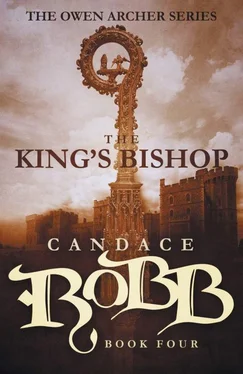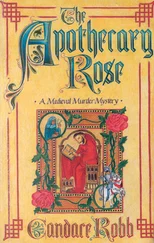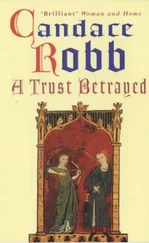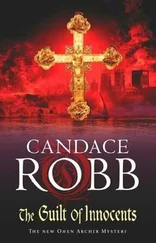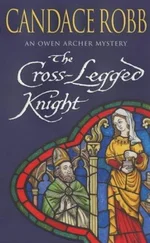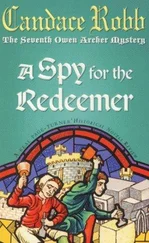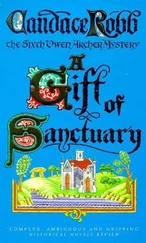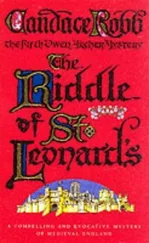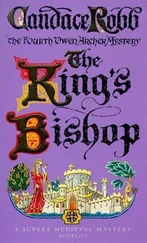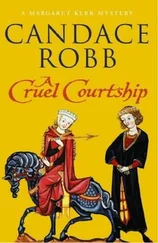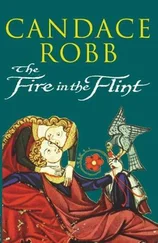Candace Robb
The Owen Archer Series:
Book Four
THE KING’S BISHOP
1996
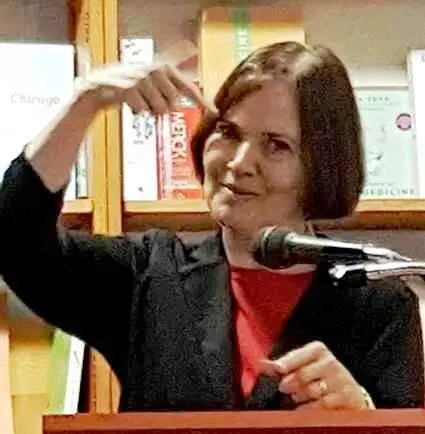
Candace Robb (b. 1950) studied for a Ph.D. in Medieval and Anglo-Saxon Literature and has continued to read and research medieval history and literature ever since. The Owen Archer series grew out of a fascination with the city of York and the tumultuous 14th century; the first in the series, The Apothecary Rose , was published in 1994, at which point she began to write full time. In addition to the UK, Australia, New Zealand, South Africa, Canada and America, her novels are published in France, Germany, Spain and Holland, and she is also available in the UK on audiobook and in large print.
To find out more about Candace Robb’s Owen Archer novels, read the Candace Robb Newsletter . For your free copy, write to the Marketing Department, William Heinemann, 20 Vauxhall Bridge Road, London SW1W 2SA. Please mark your envelope “Candace Robb Newsletter”.
You can also visit the Candace Robb website at www.candacerobb.com
I thank my editors Lynne Drew and Hope Dellon for insightful critiques and Victoria Hipps for a sharp eye for detail; for advice and information about the period I thank Jeremy Goldberg, Pat Cullum, Betty Garbutt, and the medievalists on the Mediev-L, Medsci, and Chaucer discussion lists. Thanks to Karen Wuthrich for asking just the right questions, and Charlie Robb for being a terrific sys-op and mapmaker.
Research for this book was conducted on location in Windsor and Yorkshire and at the University of York’s Morrell Library, the British Library, the University of Washington libraries and the Seattle Public Library, with additional critical materials from the York Archaeological Trust, English Heritage, and the National Trust.
bailey: castle wall enclosing the outer court, also the court itself
compline: the last of the seven canonical hours, after sunset
grange: an outlying farmhouse with barns and other outbuildings belonging to an abbey, originally staffed by lay brothers
hospitaller: in a religious house, the person whose office it is to receive pilgrims or visitors
houpelande: men’s attire; a flowing gown, often floor-length and slit up to thigh level to ease walking, but sometimes knee-length; sleeves large and open
jongleur: a minstrel who sang, juggled and tumbled
the King’s road: highways under the King’s protection
leman: mistress
liberty: an area of the city not subject to royal administration; for example, the Liberty of St Peter is the area surrounding York Minster which comes under the Archbishop’s jurisdiction
the Marches/Marcher Lords: the borders of the kingdom and the lords to whom the King granted jurisdiction over them
mazer: a large wooden cup
minster: a large church or cathedral; the cathedral of St Peter in York is referred to as York Minster
motte: the mound on which sits Windsor’s Round Tower
nones: the fifth of the seven canonical hours, or the ninth hour after sunrise
pandemain: the finest quality white bread, made from flour sifted two or three times prime the first of the seven canonical hours, or sunrise
prime: the first of the seven canonical hours, or sunrise
solar: private room on upper level of house
the wards: at Windsor, the lower ward is the court west of the Round Tower, the middle ward is the area enclosing the Round Tower, and the upper ward is the court east of the tower, enclosing King Edward III’s new royal apartments
vespers: the sixth of the canonical hours, towards sunset
white monks: Cistercians, an offshoot of the Benedictine order; their aim was to observe more strictly the rule of St Benedict
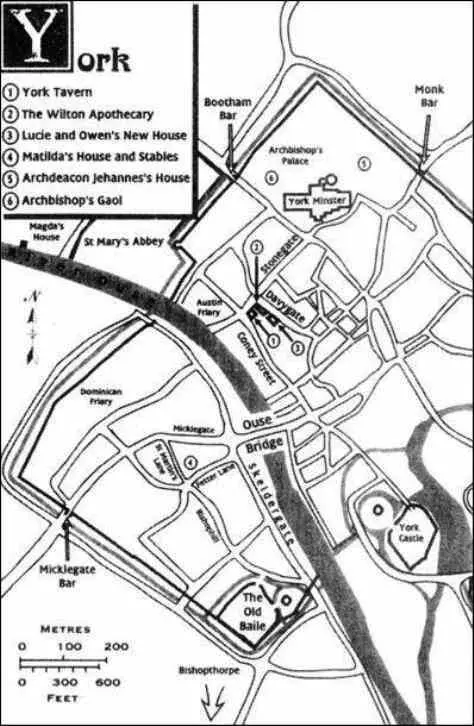
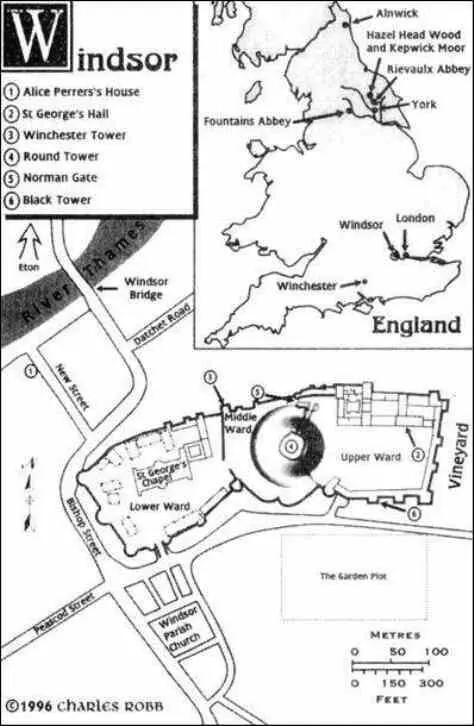
Windsor Castle, March 1367
St George’s Hall was aglow with torches and lamps, creating a firmament of stars in the glazed windows lining the far wall. The voices of the King’s courtiers rang in counterpoint to the music, their silks rustled as their feet caught the rhythm. There was an exuberance of aromas – roasted boar, exotic spices, delicately scented hair and clothing, melting beeswax, smoke, sweat, and now and then icy air as revellers slipped out to relieve their wine-bloated bladders in the privies.
A latecomer impatiently pushed aside a stumbling lord, then paused as his senses, having adjusted to the dark silence of the snowfall outside in the upper ward, were now ambushed by the noise, the heat, and the smoky glare of the torches that made him cough and blink. As he shook the snow from his brown hair, Ned Townley searched the faces at the long tables near the door, where the pages and lesser officials huddled over their food. He was looking for a young face that had become all too familiar of late. A face seen too often bent towards Mary, Ned’s betrothed.
He should not have left it so long. But the signs of Mary’s turmoil had been subtle. Frowns shrugged off as nothing, a distracted air, unexplained tears. By the time Ned had suspected and had begun spying on Mary she had reached a level of comfortable intimacy with Daniel, a page in Sir William of Wyndesore’s household, that Ned had taken months to achieve. Not that he had caught them embracing; Mary was too loyal to let it come to that without confessing all to Ned. He could see that Mary was aware of her shifting loyalties and tormented by guilt.
But he had no intention of losing Mary. His rival was a mere page, recently come to court from Dublin. What could the pup know of love? Ned had sampled women’s charms in many lands and knew that Mary was the one God meant for him. How serious could the lad’s affections be? Ned judged it would take little to frighten him off. Some sharp words, veiled threats, no more than that.
As he caught sight of Daniel, Ned felt a twinge of doubt about his suspicions. In contrast to the retainers surrounding him, the page looked a pale, delicate creature. What woman would lose her heart to such a lad? Was it possible Ned exaggerated the lad’s threat to his happiness? But it was no time to weaken. Ned must do what he could to ensure his happy future with Mary.
He squared his shoulders, put on a threatening visage. Had his old comrades in arms been beside him tonight they would have laughed and slapped him on the back, calling him a fool for love. But behind the teasing façades, Owen and Lief would have understood; they were equally besotted with the women they had coaxed to the church door.
Ned had not reckoned with the solidarity of Wyndesore’s men.
Daniel stared at his feet, his head and shoulders weighted down by remorse. He wished he were anywhere but here.
The page’s grief centred on the tall, handsome man who had faced Sir William’s retainers with disdain. “I am not such a fool as to attack a man in full view of his fellows! And a lad at that.” But the retainers had been ordered to protect their lord’s page and they meant to do so.
Читать дальше
